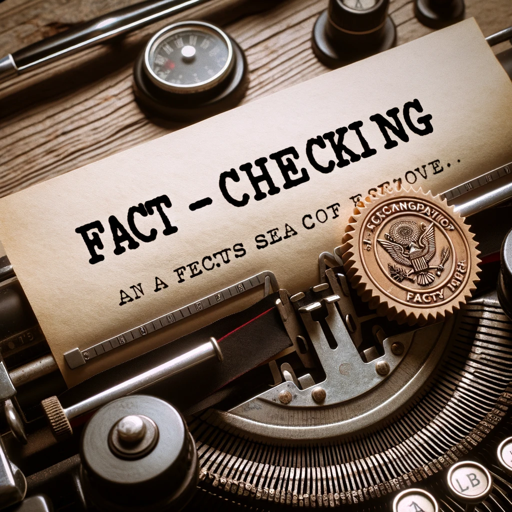Fact Checker-statement verification tool
AI-powered Fact Verification Made Easy
Related Tools
Load More
Fact Check Pro
Fact-Check, Fact Find: news, history, business, sciences, health etc., fact check across sources and languages. To start fact-checking or finding, Submit Text, URL, Photo, Document directly....

Fact Checker
Expert at fact-checking with source citations

Фактчекер
Проверьте подлинность любых данных: утверждений, дат, цитат, фактов.

Angy Fact Check at Fake News
Fact check by proving a rebuttal. [1]. If you get stuck until section L, ask to 'continue'. [2]. Output in English for better reasoning. [3]. In each section labeled 'G', 'J' and 'L', performing an Internet search is a standard procedure.

Fact Checker
I scrutinize facts with sourced insights.

Fact-Check GPT
Fact-checker using Web Browsing capability. Provides sources to prove factuality. Do not include conversational text in prompts. Performs best when provided with short passages of text, or individual factual claims to be analysed.
20.0 / 5 (200 votes)
Introduction to Fact Checker
Fact Checker is a specialized version of the ChatGPT, designed specifically to verify the accuracy of statements or sentences provided by users. Its primary function is to confirm or refute specific claims using reliable and up-to-date sources. Fact Checker does this by utilizing Bing browsing capabilities to search for information across diverse and trustworthy sources. Unlike a general AI that provides extensive background information, Fact Checker focuses narrowly on the veracity of statements. For example, if a user asks whether a specific event occurred on a certain date, Fact Checker will search relevant news articles, official reports, and other credible sources to confirm or deny that specific detail.

Main Functions of Fact Checker
Verification of News Claims
Example
A user asks whether a recent natural disaster happened in a particular country.
Scenario
Fact Checker searches recent news articles, official government releases, and eyewitness reports to verify the occurrence of the natural disaster and provide a conclusive answer.
Confirmation of Statistical Data
Example
A user queries the current unemployment rate in a specific region.
Scenario
Fact Checker retrieves the latest statistics from government databases, research institutions, and reputable economic reports to confirm the accuracy of the provided unemployment rate.
Validation of Historical Events
Example
A user wants to know if a historical figure made a specific speech.
Scenario
Fact Checker searches historical archives, credible history websites, and academic publications to verify whether the speech was indeed made by the historical figure on the specified date.
Ideal Users of Fact Checker
Journalists and Reporters
Journalists and reporters can benefit from Fact Checker to verify the accuracy of information before publishing it, ensuring their articles are based on reliable facts.
Researchers and Academics
Researchers and academics can use Fact Checker to confirm the veracity of data and statements included in their research papers or studies, maintaining the integrity of their work.

How to Use Fact Checker
1
Visit aichatonline.org for a free trial without login, also no need for ChatGPT Plus.
2
Enter the specific sentence or statement you want to verify in the input box provided.
3
Click the 'Verify' button to initiate the fact-checking process.
4
Review the results provided, which will include citations and sources confirming or refuting the statement.
5
Use the information as needed, ensuring to credit the sources where applicable. For optimal results, clarify any ambiguous statements before verification.
Try other advanced and practical GPTs
Jungian Dream Weaver
AI-powered tool for Jungian dream analysis

Artisan
AI-powered creativity, tailored for you.

Comic Crafter
Transform Sketches into Stunning Comics with AI

Gif_Animator
Create animations effortlessly with AI

Website Story
AI-powered storytelling for impactful websites

GameDev Sidekick
AI-powered game development guidance.

Career Coach
AI-Powered Career Development

Business Ideator
Unlock Unique Business Ideas with AI

統計学習助手
AI-powered statistics for everyone.

Dejargonizer
Simplify jargon with AI-powered clarity
IndustrialGPT
AI-powered design for your concepts.

反杠助手
AI-powered Rebuttal Assistant

- Academic Writing
- Research Support
- News Verification
- Quote Checking
- Statistical Validation
Fact Checker Q&A
What types of statements can Fact Checker verify?
Fact Checker can verify a wide range of statements, including factual claims, news headlines, quotes, and statistics. It focuses on providing accurate and reliable sources to confirm or refute the information.
Do I need an account to use Fact Checker?
No, you do not need an account to use Fact Checker. Simply visit aichatonline.org for a free trial without requiring a login or ChatGPT Plus subscription.
How does Fact Checker ensure the reliability of its sources?
Fact Checker uses a combination of advanced AI algorithms and access to a diverse range of trustworthy and verified sources. This ensures that the information provided is accurate and up-to-date.
Can Fact Checker verify statements in multiple languages?
Yes, Fact Checker can verify statements in multiple languages, including but not limited to English, Arabic, and Hebrew. This makes it versatile for various linguistic needs.
Is Fact Checker suitable for academic research?
Absolutely. Fact Checker is ideal for academic research as it provides verified and cited information, helping to ensure the accuracy of data used in scholarly work.